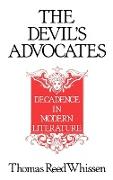The Devil's Advocates
BücherAngebote / Angebote:
It is a feat to demystify decadence genially while dealing with unsavory material usually presented complicitously. But Whissen achieves even more. He is not looking at counterculture literature but at mainstream literature in which the reader either senses something decadent in the writer's attitude or identifies some rhetorical device associated with the decadence...He focuses chiefly on authors who have been studied from other perspectives (e.g., Gide, Mann, James, Dinesen) or who have hardly been studied at all (e.g., Maugham, Firbank, Capote, Suesskind, Stephen King). Choice As a distinct literary movement, decadence made its brief appearance in the last two decades of the nineteenth century. As a theme and a philosophical posture, however, it continues to maintain a hold on the Western literary imagination. The first writer to examine the pervasive influence of decadence on modern literature, Whissen approaches the decadent vision as an attempt to come to terms with a world in decline, rather than as a transient literary fad.
He explores the ways in which decadence functions not only in modern literature but in modern life, arguing that if we fail to notice the elements of decadence in literature, it is because they are now such an accepted part of our reality that we do not recognize them as decadent. Whissen discusses two major strains of decadence that originated in Oscar Wilde's day and have continued to influence modern literature. One is the decadent work, a narrative infused with a conscious, committed self-indulgence that serves both as solace and as a form of rebellion against the perceived ugliness and hypocrisy of the modern world. The other strain includes works that have decadence as their theme, such as Wilde's The Picture of Dorian Gray. In an analysis of the prototypic French decadent novel, Huysmans' Against Nature, the author identifies the primary elements that make up the decadent temper: narcissism, masochism, irony, alienation, sophistication, vanity, sensitivity, nihilism, and a taste for uncommon or intense experience.
He traces the development of these elements in works by Wilde, Henry James, Andre Gide, Thomas Mann, and Isak Dinesen, as well as two contemporary writers--Patrick Suskind and Paul Rudnick. A significant contribution to literary scholarship and criticism, this book will be of interest for courses or studies in modern and contemporary Western literature, humanities, social history, and social psychology.
Folgt in ca. 15 Arbeitstagen
